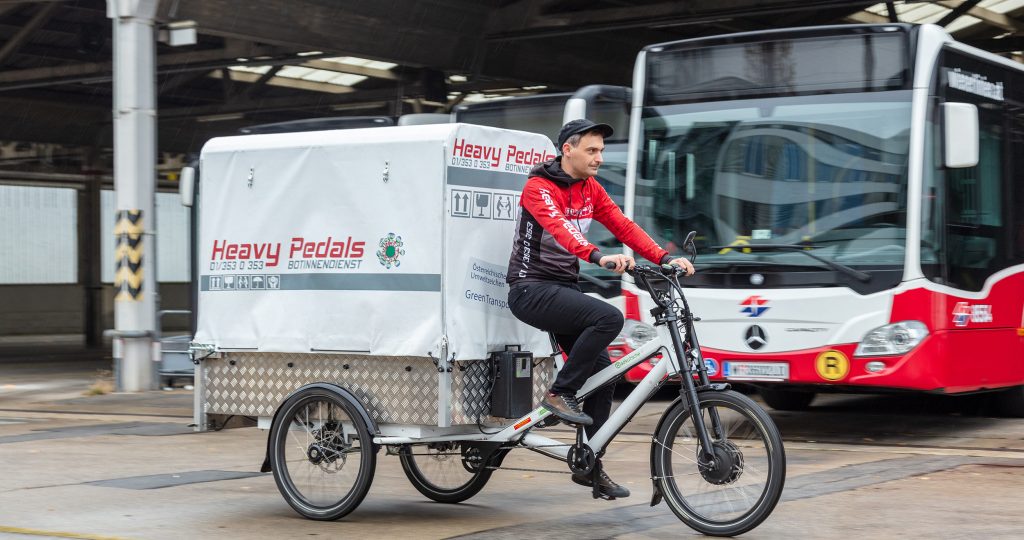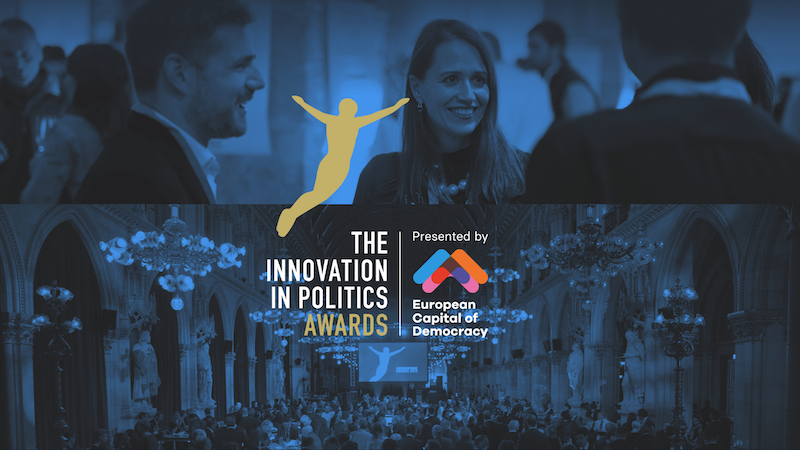In 2020, RemiHub was the first Austrian project to win the Innovation in Politics Award in the Quality of Life category. The project proves that successful cooperation between research, public and private companies and politics is not only possible, but can be extremely innovative.
The project team consists of tbw research, Wiener Linien, TU Wien / IVS (research area traffic system) and Heavy Pedals. Cooperation partners are DPD, FMS Frischelogistik, Thinkport Vienna and aspern.mobil LAB. RemiHub is funded and thus made possible by the Austrian Federal Ministry for Climate Protection, Environment, Energy, Mobility, Innovation and Technology as well as the Austrian Research Promotion Agency (FFG).
We spoke to project manager Roland Hackl and Julia Schmid from tbw research about their secret to success for productive cooperation between politics, the private sector and science and how we can achieve our climate goals in the area of mobility.
How did the idea of using Wiener Linien space for delivery logistics come about?
Roland Hackl: About 10 years ago, Wiener Linien developed the “Güterbim” project. The goal was to use the “Bim”, i.e. the tram, for the transport of parcels and other goods. At the time, this failed for a variety of reasons. Based on this idea, we thought that one could play on the operating areas rather than the vehicles themselves.
Due to rising property prices, there is growing pressure in many European cities to use every available square metre as living space. As a result, there are no or far too few spaces available for logistics purposes close to the city centre – or they are so expensive that they are out of the question for logistics. As a result, logistics and non-residential uses tend to be located on the outskirts or outside the city.
When urban and easily accessible space is so scarce, we simply have to make better use of what is available. Wiener Linien has a fairly extensive portfolio of spaces where not every square metre is used around the clock. That was our starting point.
What is the current status of RemiHub and what further developments are planned?
Julia Schmid: When we won the Innovation in Politics Award in December 2020, we were still in the test operation phase. Everything worked well and we are currently exploring possible operator models. We are also planning a transferability workshop with logistics companies in the urban area to find out how to transfer the RemiHub concept to other spaces.
How innovation-friendly is the approach of trying something out on a small scale first?
Roland Hackl: Minimising the risk of failure is essential in times of tight budgets. Handling our budget responsibly and getting as much out of it as possible for society is our primary goal. That’s why it makes sense to try something out on a manageable scale, with a small, agile and curious project team.
And instead of relying on isolated solutions, you have to think about the roll-out from the beginning and consider: which factors can be scaled and with which methodology is that possible quickly? We prepare our research findings in such a way that they can, in principle, be applied to other areas at the push of a button. So in the case of RemiHub, this means that we have found a very complex method for identifying ideal locations. It is based on data that is basically available in all countries in Europe. This makes it possible to identify the ideal RemiHub locations in every city without additional costs.
A transfer to other sectors of logistics is also possible. Since our concept works with parcel services, it is conceivable to apply it to food deliveries, pharmaceutical logistics and other logistics sectors. There are a lot of possibilities as long as specific criteria such as cold chains or safety requirements can be met.
Experience shows that many concepts developed in the research and development sector are difficult to implement in reality. That’s why it’s a big step for us that RemiHub has been included as a lighthouse project in the 2020 coalition agreement of the Vienna city government. There has never been anything like this before.
How can we imagine the cooperation with the responsible ministry?
Roland Hackl: The RemiHub project is co-financed by the Austrian Federal Ministry for Climate Protection, Environment, Energy, Mobility, Innovation and Technology. Therefore, we naturally fulfil our reporting and presence obligations at workshops and support the Federal Ministry wherever we can and are also in very close exchange on individual topics. If additional aspects come up in the course of the project, such as employment conditions in the courier, express and parcel service sector, we also pass this on to the Ministry. I think it is our duty as researchers to identify possible conflicts or barriers to innovation on the basis of our practical experiences, to inform about them and to advise accordingly. This is the only way we will be able to shape a better future in terms of mobility.
As a matter of principle, we pass on as much as possible from our research activities in order to actually produce change. Usually, the research industry steers clear of politics. We think that is a mistake. For us, a project also involves engaging with political and administrative players. We have to understand what drives them, because only then can we turn pure research into a step towards practical relevance and actual tangible effects.
Julia Schmid: The commitment of the City of Vienna has opened a lot of doors for us. In August 2021, RemiHub will be completed as a research project according to plan, so that we can then push ahead with the national and international continuation of the project’s approach.
Under what conditions can RemiHub be transferred to other cities?
Roland Hackl: RemiHub can be implemented in every city where centrally located urban areas are rare, thus making the “last mile” in logistics extremely long. And of course you need public transport companies that own a relatively large amount of land. Hamburg’s elevated railways, for example, do something similar to what we do. But underground car park operators, real estate developers, or the municipal waste collection service can also make their areas available for logistics, at least temporarily: in other words, areas that are not public but that are more or less within the sphere of influence of the public sector. This makes sense especially if these locations are not ten kilometres, but perhaps only one kilometre away from the end customers. In our experience, purchasing power is a very good indicator for the parcel delivery density to be expected. This means that where there is a lot of purchasing power, a lot of parcels will be delivered and that is why I should have my transshipment point there. Due to the drastically shorter distances, cargo bikes can also be used here.
What have you learned from working with different stakeholders from research, politics, public companies and the private sector?
Roland Hackl: Great commitment and a common image are the be-all and end-all for project success. As a project manager, I see my role as ensuring, in addition to technical and organisational tasks, that this spirit is not lost in the project team during years of cooperation, even in the face of setbacks.
And you need the right people within the partner organisations who champion the project internally and externally and who have strong networks. The support from people at the highest level at Wiener Linien naturally opens doors. Then things that seem hopeless at first can suddenly work.
Julia Schmid: And we have learned how important it is to approach all relevant departments of a large company as early as possible in order to avoid insurance or legal problems, for example.
How important are innovations in the mobility sector to achieve the climate goals?
Roland Hackl: From a sober perspective, not much has changed so far in the parcel services sector in terms of environmental sustainability. In contrast to other sectors, mobility is still going completely in the wrong direction as far as climate targets are concerned. Indicators such as emissions or the use of space are going up, the volume of traffic on the roads is increasing, individual vehicle categories are getting bigger and heavier or more inefficient. We have to turn the big wheel here in order to actually make the much-vaunted mobility turnaround tangible. So far, apart from declarations of intent, there is really nothing to be seen.
The appeal to politicians and administrators is, firstly, to listen to us as a research and development community. In other words, to make evidence-based policy. This is the only way we can truly solve problems. And what we also keep emphasising is: “Don’t get wrapped up by different industries and their narratives.” It cannot be that, for example, the mobility research agenda is defined to a large extent by the car lobby or the IT industry. Here it would be important to separate the wheat from the chaff and spend more resources on future-oriented agenda-setting.
Julia Schmid: Our project shows that it is possible to improve the situation long-term. We estimate from our project results that we could shift about 70 to 80 % of all deliveries in Vienna to cargo bikes. If we can achieve that, then that alone would be a huge step.
What are the big levers that make this possible to such an extent?
Roland Hackl: Our concept is actually technically undemanding. We don’t need any new apps, algorithms or even a lot of hardware to implement RemiHub on site. We just need a bit of space for a container to store the bikes overnight. We might need a power outlet to charge them. Nothing more. So the levers are not so much of an organisational or technical nature, but rather at the administrative level. That is, in the area of governance. In principle, this can be solved. It’s about optimising the framework conditions, such as preventing grey areas in the parcel service sector and rethinking the role of important urban players.



